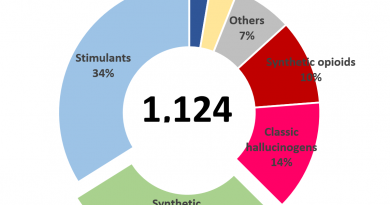UNODC EWA: New generation of synthetic cannabinoid receptor agonists circumventing legal controls in East and South-East Asia?
VIENNA, Austria – May 2022: In East and South-East Asia, a total of 16 unique new psychoactive substances (NPS) have been reported for the first time to the UNODC EWA in 2021 (see recently launched UNODC Global SMART report on “Synthetic Drugs in East and Southeast Asia – Latest Developments and Challenges 2022”). Based on preliminary data, synthetic cannabinoid receptor agonists (SCRAs) were the largest group in terms of new unique substances (7 NPS), followed by stimulants (5 NPS) and synthetic opioids (3 NPS). SCRA products pose a considerable risk to health as their content can vary both in terms of the actual substance or mixture of substances present and their concentration(s).
Figure 1: New psychoactive substances reported for the first time in East and South-East Asia in 2021*, by effect group

Source: UNODC Early Warning Advisory on NPS, 2022.
Note: *Data collection for 2021 is not completed yet and therefore subject to change. The total number of NPS reported for the first time in 2021 in East and South-East Asia amounted to 16 substances up to May 2022. 4 reporter countries were included.
Four out of seven SCRAs reported for the first time in the region belonged to the group of “OXIZIDs” (N-alkylisatin-acylhydrazones) (see Table 1).
Table 1: Synthetic cannabinoids reported for the first time in East and Southeast Asia in 2021
| Substance name | Reporting country |
| 5F-MDA-19 (5F-BZO-POXIZID) | China |
| MDA-19 (BZO-HEXOXIZID) | Singapore |
| BZO-POXIZID | China, Indonesia, Singapore |
| BZO-CHMOXIZID | Singapore |
| ADB-FUBIATA | China, Singapore |
| ADB-5Br-INACA | Singapore |
| ADB-4en-PINACA | China |
Source: UNODC Early Warning Advisory on NPS, 2022.
Note: *Data collection for 2021 is not completed yet and therefore subject to change.
The new “OXIZID” class of SCRAs recently emerged following a class-wide control of synthetic cannabinoid implemented by China in July 2021, which included most traditional indole and indazole structures (CFSRE/NPS Discovery, 2021 and 2022). The “OXIZID” class of SCRAs might not be covered under this legislation and were likely developed to circumvent these controls.The newly identified NPS in China include analogues of MDA-19 (BZO-HEXOXIZID), such as BZO-POXIZID (MDA-19 pentyl analogue) and 5F-BZO-POXIZID (5F-MDA-19) as well as ADB-FUBIATA and ADB-4en-PINACA.The new “OXIZID” class of SCRAs was also identified in Singapore (BZO-POXIZID and BZO-CHMOXIZID) and Indonesia (BZO-POXIZID) for the first time in 2021. To date, multiple OXIZID analogues have been identified worldwide, most of which are unstudied and their pharmacological and human effects are still undetermined (CFSRE/NPS Discovery, 2021 and 2022).
The emergence of new substances poses significant challenges to control efforts and health services. To assist the work of law enforcement, forensic drug testing and toxicology laboratories, UNODC provides analytical information on NPS in the UNODC EWA as well as assistance in the areas of quality assurance, provision of manuals and guidelines, field detection and handheld devices, together with training in the UNODC laboratory in Vienna and in the field.
For more information, please see:
UNODC, Synthetic Drugs in East and Southeast Asia – Latest Developments and Challenges 2022.
Liu C-M, Hua Z-D, Jia W, Li T., Identification of AD-18, 5F-MDA-19, and pentyl MDA-19 in seized materials after the class-wide ban of synthetic cannabinoids in China. Drug Test Analysis, 2021; 1-10. doi:10.1002/dta.3185
UNODC Early Warning Advisory, Generic Legislation for China (December 2021).



